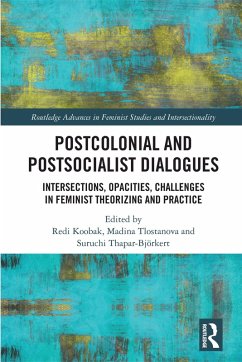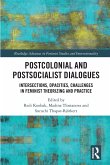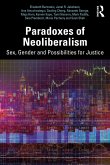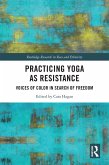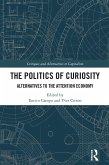Postcolonial and Postsocialist Dialogues (eBook, ePUB)
Intersections, Opacities, Challenges in Feminist Theorizing and Practice
Redaktion: Koobak, Redi; Thapar-Björkert, Suruchi; Tlostanova, Madina
42,95 €
42,95 €
inkl. MwSt.
Sofort per Download lieferbar

21 °P sammeln
42,95 €
Als Download kaufen

42,95 €
inkl. MwSt.
Sofort per Download lieferbar

21 °P sammeln
Jetzt verschenken
Alle Infos zum eBook verschenken
42,95 €
inkl. MwSt.
Sofort per Download lieferbar
Alle Infos zum eBook verschenken

21 °P sammeln
Postcolonial and Postsocialist Dialogues (eBook, ePUB)
Intersections, Opacities, Challenges in Feminist Theorizing and Practice
Redaktion: Koobak, Redi; Thapar-Björkert, Suruchi; Tlostanova, Madina
- Format: ePub
- Merkliste
- Auf die Merkliste
- Bewerten Bewerten
- Teilen
- Produkt teilen
- Produkterinnerung
- Produkterinnerung

Bitte loggen Sie sich zunächst in Ihr Kundenkonto ein oder registrieren Sie sich bei
bücher.de, um das eBook-Abo tolino select nutzen zu können.
Hier können Sie sich einloggen
Hier können Sie sich einloggen
Sie sind bereits eingeloggt. Klicken Sie auf 2. tolino select Abo, um fortzufahren.

Bitte loggen Sie sich zunächst in Ihr Kundenkonto ein oder registrieren Sie sich bei bücher.de, um das eBook-Abo tolino select nutzen zu können.
Through staging dialogues between scholars, activists and artists from a variety of disciplinary, geographical and historical specializations, Postcolonial and Postsocialist Dialogues explores the possible resonances and dissonances between the postcolonial and the postsocialist in feminist theorizing and practice.
- Geräte: eReader
- ohne Kopierschutz
- eBook Hilfe
- Größe: 2.02MB
Andere Kunden interessierten sich auch für
![Postcolonial and Postsocialist Dialogues (eBook, PDF) Postcolonial and Postsocialist Dialogues (eBook, PDF)]() Postcolonial and Postsocialist Dialogues (eBook, PDF)42,95 €
Postcolonial and Postsocialist Dialogues (eBook, PDF)42,95 €![Paradoxes of Neoliberalism (eBook, ePUB) Paradoxes of Neoliberalism (eBook, ePUB)]() Paradoxes of Neoliberalism (eBook, ePUB)39,95 €
Paradoxes of Neoliberalism (eBook, ePUB)39,95 €![Practicing Yoga as Resistance (eBook, ePUB) Practicing Yoga as Resistance (eBook, ePUB)]() Practicing Yoga as Resistance (eBook, ePUB)40,95 €
Practicing Yoga as Resistance (eBook, ePUB)40,95 €![Jean Baudrillard (eBook, ePUB) Jean Baudrillard (eBook, ePUB)]() William PawlettJean Baudrillard (eBook, ePUB)37,95 €
William PawlettJean Baudrillard (eBook, ePUB)37,95 €![The Future of Postcolonial Studies (eBook, ePUB) The Future of Postcolonial Studies (eBook, ePUB)]() The Future of Postcolonial Studies (eBook, ePUB)50,95 €
The Future of Postcolonial Studies (eBook, ePUB)50,95 €![The Politics of Curiosity (eBook, ePUB) The Politics of Curiosity (eBook, ePUB)]() The Politics of Curiosity (eBook, ePUB)42,95 €
The Politics of Curiosity (eBook, ePUB)42,95 €![De-Stalinization and the House of Culture (eBook, ePUB) De-Stalinization and the House of Culture (eBook, ePUB)]() Anne WhiteDe-Stalinization and the House of Culture (eBook, ePUB)54,95 €
Anne WhiteDe-Stalinization and the House of Culture (eBook, ePUB)54,95 €-
-
-
Through staging dialogues between scholars, activists and artists from a variety of disciplinary, geographical and historical specializations, Postcolonial and Postsocialist Dialogues explores the possible resonances and dissonances between the postcolonial and the postsocialist in feminist theorizing and practice.
Dieser Download kann aus rechtlichen Gründen nur mit Rechnungsadresse in A, B, BG, CY, CZ, D, DK, EW, E, FIN, F, GR, HR, H, IRL, I, LT, L, LR, M, NL, PL, P, R, S, SLO, SK ausgeliefert werden.
Produktdetails
- Produktdetails
- Verlag: Taylor & Francis eBooks
- Seitenzahl: 282
- Erscheinungstermin: 22. März 2021
- Englisch
- ISBN-13: 9781000361520
- Artikelnr.: 60995967
- Verlag: Taylor & Francis eBooks
- Seitenzahl: 282
- Erscheinungstermin: 22. März 2021
- Englisch
- ISBN-13: 9781000361520
- Artikelnr.: 60995967
- Herstellerkennzeichnung Die Herstellerinformationen sind derzeit nicht verfügbar.
Redi Koobak is Postdoctoral Research Fellow at the Centre for Women's and Gender Research, University of Bergen, Norway. Madina Tlostanova is Professor of Postcolonial Feminisms at Linköping University, Sweden. Suruchi Thapar-Björkert is Docent and Senior Lecturer at the Department of Government, University of Uppsala, Sweden.
1. Introduction: Uneasy Affinities between the Postcolonial and the Postsocialist PART I: Intersections 2. Locating Postsocialist Precarity in Global Coloniality: A Decolonial Frame for 1989? 3. A Conversation on Imperial Legacies and Postsocialist Contexts: Notes from a US-Based Feminist Collaboration 4. Bridging Postcoloniality, Postsocialism, and "Race" in the Age of Brexit: An Interview with Catherine Baker 5. Queering "Postsocialist Coloniality": Decolonizing Queer Fluidity and Postsocialist Postcolonial China 6. Circassian Trajectories between Post-Soviet Neocolonialism, Indigeneity, and Diasporic Dispersions: A Conversation PART II: Opacities 7. Opacity as a Feminist Strategy: Postcolonial and Postsocialist Entanglements with Neoliberalism 8. Anti-colonial Struggles, Postcolonial Subversions: An Interview with Nivedita Menon 9. Uneventful Feminist Protest in Post-Maidan Ukraine: Nation and Colonialism Revisited 10. Postsocialist Poetics: Interview with Kr
lex Zentr 11. Speaking Against the Void: Decolonial Transfeminist Relations and Radical Potentialities PART III: Challenges 12. How to See the Spots of the Leopard: An Interview with Quinsy Gario and Jörgen Gario 13. Uneasy "Posts" and Unmarked Categories: Politics of Positionality between and beyond the Global South and the European East. An Interview with Manuela Boatc
14. Connecting the "Posts" to Confront Racial Capitalism's Coloniality 15. "We need to learn about each other and unlearn patterns of racism.": A Conversation with Angéla Kóczé 16. Cripping Postsocialist Chronicity: A Conversation with Kate
ina Kolá
ová 17. Grappling with the "China Crisis": Positionality, Impasse, and Potential Breakthrough of Chinese Feminist Diaspora in Post-Cold War North America 18. Gendered Nationalism in India and Poland: Postcolonial and Postsocialist Conditions in Times of Populism
lex Zentr 11. Speaking Against the Void: Decolonial Transfeminist Relations and Radical Potentialities PART III: Challenges 12. How to See the Spots of the Leopard: An Interview with Quinsy Gario and Jörgen Gario 13. Uneasy "Posts" and Unmarked Categories: Politics of Positionality between and beyond the Global South and the European East. An Interview with Manuela Boatc
14. Connecting the "Posts" to Confront Racial Capitalism's Coloniality 15. "We need to learn about each other and unlearn patterns of racism.": A Conversation with Angéla Kóczé 16. Cripping Postsocialist Chronicity: A Conversation with Kate
ina Kolá
ová 17. Grappling with the "China Crisis": Positionality, Impasse, and Potential Breakthrough of Chinese Feminist Diaspora in Post-Cold War North America 18. Gendered Nationalism in India and Poland: Postcolonial and Postsocialist Conditions in Times of Populism
1. Introduction: Uneasy Affinities between the Postcolonial and the Postsocialist PART I: Intersections 2. Locating Postsocialist Precarity in Global Coloniality: A Decolonial Frame for 1989? 3. A Conversation on Imperial Legacies and Postsocialist Contexts: Notes from a US-Based Feminist Collaboration 4. Bridging Postcoloniality, Postsocialism, and "Race" in the Age of Brexit: An Interview with Catherine Baker 5. Queering "Postsocialist Coloniality": Decolonizing Queer Fluidity and Postsocialist Postcolonial China 6. Circassian Trajectories between Post-Soviet Neocolonialism, Indigeneity, and Diasporic Dispersions: A Conversation PART II: Opacities 7. Opacity as a Feminist Strategy: Postcolonial and Postsocialist Entanglements with Neoliberalism 8. Anti-colonial Struggles, Postcolonial Subversions: An Interview with Nivedita Menon 9. Uneventful Feminist Protest in Post-Maidan Ukraine: Nation and Colonialism Revisited 10. Postsocialist Poetics: Interview with Kr
lex Zentr 11. Speaking Against the Void: Decolonial Transfeminist Relations and Radical Potentialities PART III: Challenges 12. How to See the Spots of the Leopard: An Interview with Quinsy Gario and Jörgen Gario 13. Uneasy "Posts" and Unmarked Categories: Politics of Positionality between and beyond the Global South and the European East. An Interview with Manuela Boatc
14. Connecting the "Posts" to Confront Racial Capitalism's Coloniality 15. "We need to learn about each other and unlearn patterns of racism.": A Conversation with Angéla Kóczé 16. Cripping Postsocialist Chronicity: A Conversation with Kate
ina Kolá
ová 17. Grappling with the "China Crisis": Positionality, Impasse, and Potential Breakthrough of Chinese Feminist Diaspora in Post-Cold War North America 18. Gendered Nationalism in India and Poland: Postcolonial and Postsocialist Conditions in Times of Populism
lex Zentr 11. Speaking Against the Void: Decolonial Transfeminist Relations and Radical Potentialities PART III: Challenges 12. How to See the Spots of the Leopard: An Interview with Quinsy Gario and Jörgen Gario 13. Uneasy "Posts" and Unmarked Categories: Politics of Positionality between and beyond the Global South and the European East. An Interview with Manuela Boatc
14. Connecting the "Posts" to Confront Racial Capitalism's Coloniality 15. "We need to learn about each other and unlearn patterns of racism.": A Conversation with Angéla Kóczé 16. Cripping Postsocialist Chronicity: A Conversation with Kate
ina Kolá
ová 17. Grappling with the "China Crisis": Positionality, Impasse, and Potential Breakthrough of Chinese Feminist Diaspora in Post-Cold War North America 18. Gendered Nationalism in India and Poland: Postcolonial and Postsocialist Conditions in Times of Populism
